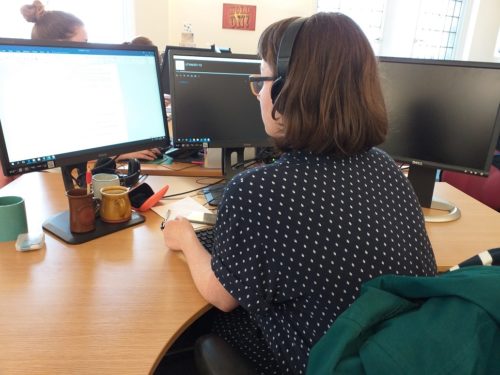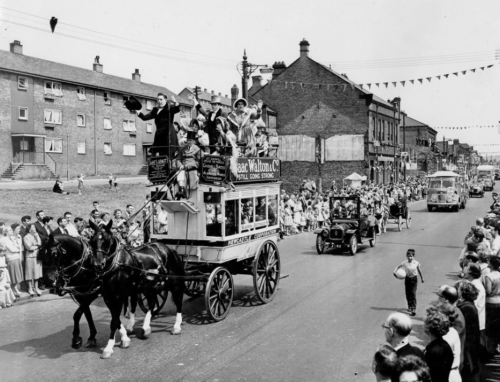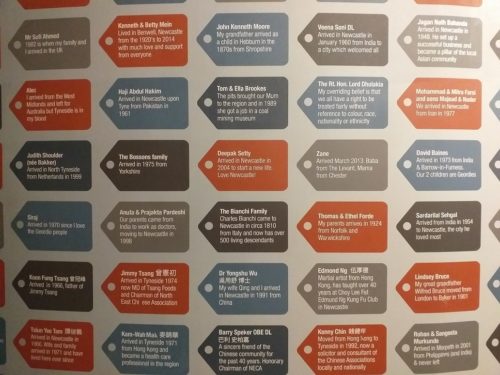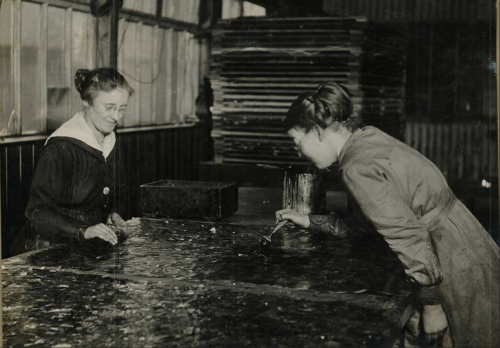Folk songs often tell the stories of everyday people. They expose counter narratives to accepted history and allow personal connections to be made across time, age and class. I have been involved in folk traditions my whole life; the stories of industry, war and the hardiness of the people of the North-East that I have listened to through my involvement in the UOSH project fit in perfectly with the narratives I hear so often in traditional songs. While I already knew of the immense change that had occurred between 1900 and 2000, these recordings highlighted how this change affected everyday lives – from the difference in schooling and technology, the effect of rationing and bombing in the North-East during WW2, to the development in attitudes toward married women working.

Rose listening to an oral history recording from the TWAM collection
In reflecting on my own position in life, listening to these oral histories emphasised to me how little I knew about my parent’s or grandparent’s lives before I was born. I knew of their occupations and I knew broadly of their family life but that was all. In hearing stories of caning in schools, I wondered if my father, born in 1949, had experienced this. He told me he had. And it was accepted as normal. I reflected on my own schooling, thinking particularly of one teacher who terrified the younger students and I wondered how much worse it would have been if he had been allowed to cane them. I listened to the story of a woman who, at 17, moved from Pakistan to England and was made to work for her mother-in-law and given little freedom. Consequently, I reflected on things my mother had told me about sneaking out of her room as a teenager to go out with friends. And considered the freedom she then gave me as I was growing up. Listening to this woman discuss the breakdown of her marriage and having to learn, as an adult, to do everything independently is another example of the resilience of previous generations which shines through in these recordings. Despite the hardships of these people, their enjoyment of life is also evident.

Grand Parade passing along Scotswood Road, celebrating the Centenary of the Blaydon Races, 9 June 1962. TWAM ref. DS.VA/9/PH/3/8
On hearing how another man moved to Newcastle and set up his work in the Ouseburn valley (an area I have come to know and love), the change from industry to arts in the area was highlighted and I began to reflect on what change has occurred in Newcastle in the time I have lived here. Regeneration has been a key topic of conversation in many of these recordings – some focusing positively on the development of previous industrial sites and others negatively on building for profit without the consideration of local communities. Despite only living here since 2015, I have seen the rapid development and building of student accommodation and the opening of new pubs, restaurants, cafes and art spaces (some of which make use of old industrial spaces). These recordings and my own experience illustrate how rapidly cities can change and make me wonder what change will come in the next 100 years.

This wall of luggage labels can be found in the Destination Tyneside gallery in Discovery Museum and highlight some of the individuals who have made Tyneside their home.
These sound recordings don’t just tell the story of the North-East, they tell the story of people from varied backgrounds who have all come to see this area of the world as their home. They consistently emphasise the friendliness of the people of the North-East, something I have experienced so often in the nearly 4 years I have lived in Newcastle. They highlight the importance of community – from the friendships women made as war workers to the rallying of residents in fighting government plans to demolish their housing estate. Most importantly, these recordings can highlight all these aspects within the lives of listeners. They can inspire and motivate, make you grateful for what you have and determined to fight for what you don’t. I have loved listening to these recordings and am happy knowing that my work in cataloguing them brings them a step closer to being accessible online. The work that is being done on the Unlocking Our Sound Heritage project will allow many others to learn about the North-East’s past through the eyes of everyday people, to reflect on the present through this past and, hopefully, to love listening to them as much as I did.

Making micante sheets (1914 – 18). This image is from the Parsons’ ‘Women Labourers’ photograph album, taken at Parsons’ Works on Shields Road during the First World War. TWAM ref: 2402.
Rose was a placement student in the summer of 2019. If you are interested in undertaking a placement with the Unlocking Our Sound Heritage Project, we have availability throughout the year. Please register your interest at [email protected]
Unlocking Our Sound Heritage is funded by a grant from the National Lottery Heritage Fund, as well as generous funding from charities and individuals. The project is led by the British Library. To read more please see https://twarchives.org.uk/unlocking-our-sound-heritage



![]()
One Response to Reflecting on the present through the past – by Rose Bibby, placement student